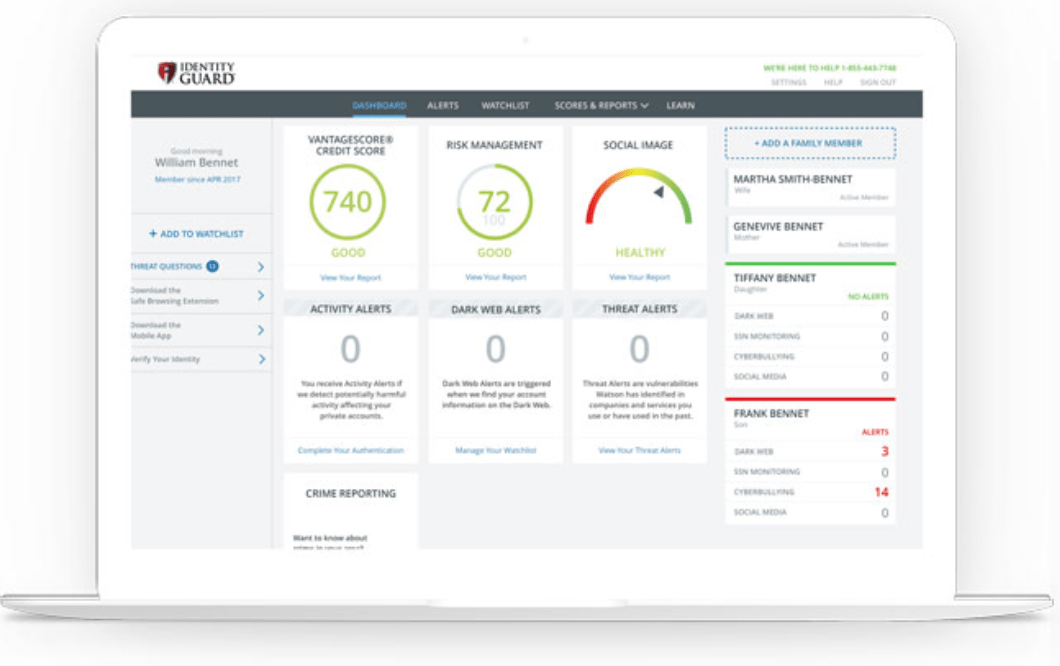LifeLock is an excellent identity theft protection service. But if you’re still on the fence about signing up for it, we’d like to mention that the provider comes with a free trial. So, you could use it to try the service risk-free.
That said, LifeLock’s free trials are a bit confusing. That’s mainly because the product is available as a standalone purchase, or as part of a bundle. We’ll cover everything you need to know about that in this guide.
LifeLock Essentials
LifeLock is among the best identity theft protection services on the market. It has essential credit monitoring and identity protection features, and also includes useful advanced identity protection tools, like home title monitoring, social media monitoring, and fictitious identity monitoring.
However, LifeLock’s product line can be a bit of a head-scratcher. It has several plans, and not all of them are displayed together on the provider’s pricing pages. What’s more, LifeLock can also be bought as a standalone product, or bundled together with Norton 360, a really good antivirus.
And all of that will influence the duration of your free trial. If you get just LifeLock, you’re eligible for a 30-day trial. But if you go for the NortonLifeLock bundles, you only get a 7-day trial.
We think that combining Norton 360 and LifeLock is the best way to experience LifeLock. ID theft and malware protection should go hand in hand. Besides, if you absolutely don't want Norton 360, you can downgrade to a LifeLock-only plan once the trial period is over (more on this below). However, there's one downside if you choose to trial the bundle, as we’ll explain below.
Pro Tip: Keeping your devices free of bugs, ransomware, and assorted bad code is a huge part of good digital hygiene. But take it from the pros: staying bug-free is almost impossible without some kind of malware protection software.
LifeLock Free Trial: 7 or 30 Days?
To try LifeLock for 30 days, you need to choose a LifeLock-only plan, either the Standard, Advantage, or Ultimate Plus. It doesn't matter if you choose a monthly or yearly subscription, the first 30 days will be free and LifeLock will charge your payment method only once the trial is over.
The Norton 360 with LifeLock Select Plus bundle only has a 7-day trial, and it also requires you to choose a yearly subscription. The same rules apply: you won't be charged in the first seven days, but once the trial is over, you'll automatically get a bill for a one-year subscription of your plan of choice.
Keep in mind that the bundle only includes either LifeLock Select, which is similar to LifeLock Standard (entry-level), or LifeLock Ultimate Plus (top-tier). There’s no middle ground – you either go for the cheapest or the most expensive LifeLock subscription to bundle with Norton 360.
LifeLock Free Trial Breakdown
| Trial | Your Plan Options |
|---|---|
| 30-day free trial |
|
| 7-day free trial |
|
Insider Tip 1: Cancelling Your LifeLock Free Trial
If you don’t want to continue with LifeLock, the first thing you’ll need to do is deactivate auto renewal. You can do that by signing in to your LifeLock account, and then clicking “Manage my account.”
As long as you do that before your trial ends, you will not be charged, but you get to keep the trial up to the last day. Otherwise, if you get charged, you have one more option: request a refund. Now, the period during which you can request a refund depends on your subscription. If you purchased an annual subscription, you can request a refund up to 60 days after LifeLock charged you. We recommend that you do it sooner rather than later, though, as refund requests can take several days to process. On the other hand, if you went with a monthly subscription, you have 14 days to cancel and request a refund.
Did You Know? Totally new to ID theft protection? Welcome aboard. Check out our ID Theft Protection Buyer’s Guide to learn about all the types of ID theft out there and what you can do to start protecting yourself.
Insider Tip 2: Downgrading Your LifeLock Subscription After the Trial Period
If you test LifeLock and like what you see, and want to continue without Norton 360, you can cancel your bundled subscription. After that, you can sign up for any of the available LifeLock-only subscriptions.
That’s worth pointing out for readers who might have their own virtual private network (VPN) subscription with malware protection. There is no reason, in other words, why you can’t combine best-in-class ID theft protection with a first-rate VPN.
Pro Tip: To downgrade to a LifeLock-only plan from your Norton 360 with LifeLock Select Plus plan after the trial period, you’ll need to cancel your bundle subscription and register for a new plan. You’ll also need to download a new desktop application.
LifeLock Plan Pricing
If you choose to trial a LifeLock-only plan for 30 days, you can pick from three tier-based subscriptions: LifeLock Standard, LifeLock Advantage, and LifeLock Ultimate Plus. All subscriptions come with a monthly and a yearly plan.
Now, if you trial the NortonLifeLock bundle for seven days, your options are more limited. The bundle only comes with LifeLock Select, a subscription that’s similar in features to LifeLock Standard, and LifeLock Ultimate Plus. In addition, you can only sign up via the annual plan.
LifeLock Plans and Pricing Breakdown
| Subscription | 1-Month Plan Price | 1-Year Plan Price (1st yr.) | 1-Year Plan Price (After Renewal) |
|---|---|---|---|
| LifeLock Standard | $11.99 per month | $89.99
($7.50 per month) |
$124.99 per year
($10.41 per month) |
| LifeLock Advantage | $22.99 per month | $179.88
($14.99 per month) |
$239.99 per year
($19.99 per month) |
| LifeLock Ultimate Plus | $34.99 per month | $239.88
($19.99 per month) |
$339.99 per year
($28.33 per month) |
| Norton 360 with LifeLock Select Plus | N/A | $69.99 | $189.99 per year |
| Norton 360 with LifeLock Ultimate Plus | N/A | $299.99 | $364.99 per year |
FYI: All those plans are for individuals. LifeLock also offers options for couples (two adults) and families (two adults and up to five kids). See our LifeLock pricing guide for more information.
LifeLock Plan Features
It’s true that one major difference in LifeLock’s plans is the amount they’ll reimburse you for in the event of actual stolen funds. With the Ultimate Plus plan, you can receive up to $3 million.
But, honestly, the stars would have to be seriously misaligned for you to get scammed to the tune of a cool mil during your LifeLock trial period. So we’d say the extra stolen fund reimbursement isn’t a huge incentive to trial Ultimate Plus.
However, while you’re choosing a LifeLock option to trial, it’s worth considering what kind of protection you’re going to want over the long haul.
Did You Know? Ever wonder how companies like LifeLock actually get your identity back for you if it does get stolen? They send in ID Restoration Specialists. Restoration Specialists will work with you to restore your identity anywhere it’s been compromised.
For instance, while all three LifeLock packages come with privacy and dark web monitoring, data breach alerts, and ID and Social Security alerts, LifeLock Ultimate Plus is the only plan that gives you triple-bureau credit monitoring. Check out our LifeLock review for the full story on why triple-bureau credit monitoring might come in handy. Here’s the short version.
We have three agencies that issue credit reports in the U.S. (TransUnion, Equifax, and Experian). If there’s a problem with just one of them — and you’re unaware — you could be in for some serious financial trouble down the line. If you think you wouldn’t be able to sleep at night without complete credit monitoring, we’d definitely recommend trialing Ultimate Plus.
Otherwise, the lighter, less expensive Select or Advantage plans would be our free trial choice.
LifeLock Features by Plan
| Norton 360 with LifeLock Select Plus | LifeLock Standard | LifeLock Advantage | LifeLock Ultimate Plus | |
|---|---|---|---|---|
| Features |
|
|
|
|
LifeLock Ultimate Plus monitors your credit at all three credit bureaus as well as your savings and home title.
Did You Know? Fraudsters can hack their way into your home title and use it to take out loans in your name. That’s where home title monitoring is a lifesaver (available with LifeLock Ultimate Plus). With your house title under lock and key, if a thief ever uses it for nefarious purposes, you’ll get an instant alert.
LifeLock’s Free Trial Compared
Considering that many identity protection services don't offer a free trial, LifeLock's up to 30-day trial is pretty generous. We're talking about 30 days of free service. Plus, once your trial ends and you start paying, you'll get 60 days to cancel and request a refund (if you go with a yearly plan; 14 days if you choose a monthly option).
IdentityForce also offers a 30-day free trial, but only for the UltraSecure subscriptions. And Experian’s identity theft protection service has a free trial for its Premium and Family subscriptions, but it’s only for 7 days.
Is LifeLock’s Free Trial Worth It?
Yes, as LifeLock provides some of the best free trial options on the market. The 30-day trial you get with its standalone product gives you more than enough time to test out the service to make sure it’s right for you or your family.
The 7-day trial is also pretty good, but we’d only recommend getting it if you really want to get access to other Norton security tools, like its antivirus and password manager.
Plus, don’t forget — even after the trial is over, you’re still covered by a 60-day refund if you bought a long-term plan (and a 14-day refund if you got the monthly plan).
LifeLock Free Trial FAQs
Does LifeLock have a free trial?
Yes, it does, for both its monthly and yearly plans.
How many days can I test LifeLock for free?
That depends on which plan you try. If you trial a LifeLock-only plan, you have 30 days regardless of whether you go with a monthly plan or a yearly plan. But if you go with the Norton 360 with LifeLock Select Plus bundle, you only have seven days.
Can I trial all of LifeLock’s plans?
Yes, you can trial all LifeLock plans. LifeLock-only plans — Standard, Advantage, and Ultimate Plus — come with a 30-day free trial. The Norton 360 with LifeLock Select Plus bundle, meanwhile, comes with a seven-day trial.
If I trial Norton 360 with LifeLock Select Plus, can I downgrade to a basic plan?
Yes, but you have to cancel your Norton 360 subscription first and then sign up for your new plan.
Does my free trial come with a VPN?
Yes, the Norton 360 with LifeLock Select Plus subscription comes with a VPN. And you can install and use the VPN on up to 10 devices.









